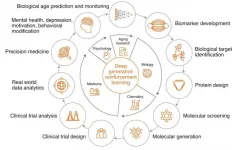(Press-News.org) New research suggests that a higher dietary intake of long chain omega-3 fatty acids in childhood may reduce the risk of developing subsequent asthma, but only in children carrying a common gene variant. The study, led by Queen Mary University of London, is in collaboration with the University of Bristol and University of Southampton, UK, and Karolinska Institutet, Sweden.
In the UK, 1.1 million children (1 in 11) are currently receiving treatment for asthma and most adult asthma begins in childhood. The NHS spends around £1 billion a year treating and caring for people with asthma.
Senior author, Professor Seif Shaheen from Queen Mary University of London, said: "Asthma is the most common chronic condition in childhood and we currently don't know how to prevent it. It is possible that a poor diet may increase the risk of developing asthma, but until now most studies have taken 'snap-shots', measuring diet and asthma over a short period of time. Instead, we measured diet and then followed up children over many years to see who developed asthma and who didn't.
"Whilst we cannot say for certain that eating more fish will prevent asthma in children, based on our findings, it would nevertheless be sensible for children in the UK to consume more fish, as few currently achieve recommended intake."
Fish is of particular interest because it is a rich source of the long chain omega-3 fatty acids, eicosapentaenoic acid (EPA) and docosahexaenoic acid (DHA), which have anti-inflammatory properties.
The study, published in the European Respiratory Journal, used data from a large UK birth cohort, Children of the 90s, which recruited mothers who were pregnant in the early 1990s and has been following up their offspring ever since. They analysed the association between intake of EPA and DHA from fish at 7 years of age (estimated by food frequency questionnaires) and incidence of new cases of doctor-diagnosed asthma at 11-14 years of age.
Long chain omega-3 intake from fish was not associated with asthma in the cohort as a whole (4,543 people). However, the team looked in more detail at children with a particular genetic make-up. More than half of the children carried a common variant in the fatty acid desaturase (FADS) gene which is associated with lower levels of long chain omega-3 fatty acids in the blood. In these children, a higher dietary intake of long chain omega-3 fatty acids was associated with a lower risk of asthma. The risk was 51 per cent lower, comparing those in the top quartile of long chain omega-3 intake with those in the bottom quartile.
Furthermore, this finding was also found in an independent birth cohort study in Sweden (BAMSE).
As they have only found an observational association, the researchers caution that they cannot say for certain that a higher intake of long chain omega-3 fatty acids in childhood can prevent the subsequent development of asthma. The next step is to see if higher intake is also associated with a lower risk of exacerbations in children who already have asthma.
The project was funded by the Rosetrees Trust and The Bloom Foundation. The UK Medical Research Council, Wellcome and the University of Bristol provide core support for Children of the 90s.
INFORMATION:
For more information, please contact:
Joel Winston
Communications Manager (School of Medicine and Dentistry)
Queen Mary University of London
j.winston@qmul.ac.uk
Tel: +44 (0)7968 267 064
Notes to the editor
* Research paper: 'Intake of n-3 polyunsaturated fatty acids in childhood, FADS genotype, and incident asthma'. Mohammad Talaei, Emmanouela Sdona, Philip C. Calder, Louise R. Jones, Pauline M. Emmett, Raquel Granell, Anna Bergström, Erik Melén, Seif O. Shaheen. European Respiratory Journal. DOI 10.1183/13993003.03633-2020
Available here after the embargo lifts: https://doi.org/10.1183/13993003.03633-2020
About Queen Mary University of London
At Queen Mary University of London, we believe that a diversity of ideas helps us achieve the previously unthinkable.
In 1785, Sir William Blizard established England's first medical school, The London Hospital Medical College, to improve the health of east London's inhabitants. Together with St Bartholomew's Medical College, founded by John Abernethy in 1843 to help those living in the City of London, these two historic institutions are the bedrock of Barts and The London School of Medicine and Dentistry.
Today, Barts and The London continues to uphold this commitment to pioneering medical education and research. Being firmly embedded within our east London community, and with an approach that is driven by the specific health needs of our diverse population, is what makes Barts and The London truly distinctive.
Our local community offer to us a window to the world, ensuring that our ground-breaking research in cancer, cardiovascular and inflammatory diseases, and population health not only dramatically improves the outcomes for patients in London, but also has a far-reaching global impact.
This is just one of the many ways in which Queen Mary is continuing to push the boundaries of teaching, research and clinical practice, and helping us to achieve the previously unthinkable.
About Children of the 90s
Based at the University of Bristol, Children of the 90s, also known as the Avon Longitudinal Study of Parents and Children (ALSPAC), is a long-term health research project that enrolled more than 14,000 pregnant women in 1991 and 1992. It has been following the health and development of the parents, their children and now their grandchildren in detail ever since. It receives core funding from the Medical Research Council, the Wellcome Trust and the University of Bristol.
Helping people to self isolate after testing positive for covid-19 must now be a top priority for the UK government, argue experts in The BMJ today.
Dr Muge Cevik at the University of St Andrews and colleagues say the focus should be on those working in high exposure occupations, living in overcrowded housing, or without a home, and should include free and safe accommodation alongside adequate income support, job protection, and help with caring responsibilities.
Most countries have used testing as a tool to interrupt transmission chains by encouraging ...
Access to legal cannabis stores is associated with a reduction in opioid related deaths in the United States, particularly those linked to synthetic opioids such as fentanyl, finds a study published by The BMJ today.
Opioids are 'morphine-type' drugs that relieve short-term (acute) pain and pain at the end of life. There is little evidence that they are helpful for long-term (chronic) pain, but they are often prescribed for this reason.
This has led to widespread misuse and a sharp rise in overdose deaths, particularly in the United States. In 2018, there were more than 46,000 fentanyl related deaths, representing over two thirds of all US opioid related deaths that ...
A new study has shown that, while there is limited evidence for overall increased mortality in patients with atopic eczema, those with severe atopic eczema may have a greater risk of dying from several health issues compared with those without eczema, according to a new study in the Journal of Allergy and Clinical Immunology.
The research team, led by the London School of Hygiene & Tropical Medicine (LSHTM) and funded by the Wellcome Trust, compared the risk of dying in over 500,000 adults with atopic eczema with more than 2.5 million without eczema. Patients with severe atopic eczema had a 62% higher risk of dying compared to ...
27th of January, Wednesday, Hong Kong - Deep Longevity, a fully-owned subsidiary of Regent Pacific (HKEX: 0575), specializing in the development and the application of next-generation artificial intelligence (AI) for aging and longevity research, today announced the publication of an article in END ...
The thought of eating insects is stomach turning for many, but new Edith Cowan University (ECU) research is shedding light on allergy causing proteins which could pose serious health risks for those suffering from shellfish allergy.
The research, published in the journal Food Chemistry, identified 20 proteins found in cricket food products which could cause serious allergic reactions.
The project was led by Professor Michelle Colgrave from ECU's School of Science and the CSIRO.
Professor Colgrave said crickets and other insects could be the key to feeding ...
DALLAS (January 26, 2021) - Many people believe that they can't change their brains, or that their brain health will inevitably decline as they age. But the Strategic Memory Advanced Reasoning Tactics (SMART) training protocol, created by researchers and clinicians at the Center for BrainHealth®, has been demonstrated over the past two decades to improve cognitive function and psychological well-being in laboratory participants. Recent research suggests that SMART can even make long-lasting improvements to people's brain health when given outside of the lab in short, informal training sessions.
A paper detailing these findings was recently published in Military Medicine. The research was a collaboration between Leanne R. Young, PhD, of Applied Research Associates, ...
The widespread use of cashless payments including credit cards, debit cards, and mobile apps has made transactions more convenient for consumers. However, results from previous research have shown that such cashless payments can increase consumers' spending on unhealthy food. "Why Do Cashless Payments Increase Unhealthy Consumption? The Decision-Risk Inattention Hypothesis," a newly published article in the Journal of the Association for Consumer Research, explains this phenomenon by showing how changes in bodily responses to cashless payments influence consumers responses.
Authors Joowon Park, Clarence Lee, and Manoj Thomas propose that cash and cashless payments elicit different levels of negative arousal when making shopping ...
The development of small hydropower dams is widespread throughout Brazil and elsewhere in the world, vastly overshadowing large hydropower projects. The proliferation of these smaller dams is a response to growing energy and security needs. Their expansion, however, threatens many of the remaining free-flowing rivers and biodiverse tropical regions of the world -- interrupting the migrations of freshwater fishes, on which millions of peoples' livelihoods depend.
A new University of Washington paper published Jan. 11 in Nature Sustainability quantifies these tradeoffs between hydroelectric generation capacity and the impacts on river connectivity ...
Popular folklore and anecdotal evidence suggest that people in a hypnotic or suggestible state can experience sensory hallucinations, such as perceiving sounds and sights that are not actually there. Reliable scientific evidence of these experiences, however, has been notoriously challenging to obtain because of their subjective nature.
New research published in the journal Psychological Science provides compelling evidence that hypnotic suggestions can help highly susceptible people "see" imaginary objects, equipping them with the missing details needed to solve an otherwise challenging visual puzzle.
"Hypnosis holds intriguing effects on human behavior," said Amir Raz, a researcher at McGill University and coauthor on the paper. "The careful, systematic study of hypnotic phenomena can ...
BUFFALO, N.Y. - A new study led by a University at Buffalo researcher has identified how specific communication among different brain regions, known as brain connectivity, can serve as a biomarker for attention deficit hyperactivity disorder (ADHD).
The research relied on a deep architecture using machine-learning classifiers to identify with 99% accuracy those adults who had received a childhood diagnosis of ADHD many years earlier.
"This suggests that brain connectivity is a stable biomarker for ADHD, at least into childhood, even when an individual's ...


